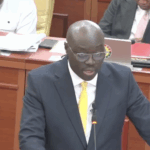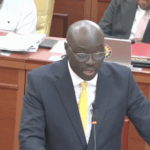
Finance Minister Dr. Cassiel Ato Forson has come out swinging against critics who say the government is failing to spend where it matters most.
Presenting the 2025 Mid-Year Fiscal Policy Review to Parliament on Wednesday, July 24, he declared, “Contrary to the perception that we are not spending, we are indeed spending—and spending at the right places.”
His remarks directly confronted what he described as a “false narrative” of government inaction or misplaced priorities.
“We are making the right investments,” he stressed, before unveiling a sweeping breakdown of payments made across critical sectors of the economy.
In a moment designed to silence sceptics, Dr. Forson rolled out an exhaustive list of financial commitments executed between January and June 2025.
At the top of the list: a US$700 million Eurobond payment, which he cited as evidence of Ghana’s re-engagement with its global financial obligations.
But that was just the beginning.
“We have paid GH¢10 billion to domestic bondholders,” the Minister said, emphasizing the government’s commitment to restoring confidence in local debt markets.
He went further to highlight what he called “key investments in essential services”:
- GH¢2.9 billion to the District Assemblies Common Fund (DACF)
- GH¢2.7 billion to SSNIT to safeguard pensions
- GH¢9.1 billion to the energy sector to ensure a stable electricity supply
- GH¢5 billion to clear outstanding arrears
- GH¢4.6 billion to the Ghana Education Trust Fund (GETFund)
Education, health, and social protection also featured prominently in his list of “impactful spending.”
“We’ve paid GH¢1 billion to sustain free secondary education, GH¢4.6 billion to the National Health Insurance Scheme, and another GH¢1.4 billion to clear NHIS claims,” he announced.
He added that GH¢252 million had been spent on vaccines and essential medicines, GH¢72.8 million on the Capitation Grant, and GH¢895 million to keep the School Feeding Programme running.
“We are not starving the vulnerable either,” he said, pointing to GH¢477 million paid to LEAP beneficiaries, GH¢300 million to the No Fee Stress Policy, GH¢122.8 million for BECE registration, and a combined GH¢654 million to support teacher and nursing trainees.
Dr. Forson also disclosed that GH¢25 million had been paid in Assembly Members’ allowances, GH¢21 million to the National Apprenticeship Programme, and GH¢34.5 million to support the Adwumawura Programme, a jobs and enterprise initiative.
In a move aimed at both bureaucratic efficiency and institutional survival, the Minister revealed that GH¢2 billion had been paid to ensure government Ministries, Departments and Agencies continue to function effectively, and another GH¢2 billion had been used to rescue the struggling National Investment Bank (NIB).
“This is not random spending. These are deliberate, targeted interventions to protect the vulnerable, invest in human capital, and maintain economic stability,” Dr. Forson insisted.
Summing it all up, the Finance Minister said non-interest expenditures amounted to GH¢84.2 billion, while total payments from the Consolidated Fund in the first half of 2025 stood at a staggering GH¢114.5 billion.
“We are not asleep at the wheel. We are working—with focus, responsibility, and urgency—to reset this economy for the Ghana we want,” he concluded, echoing the theme of the mid-year review.
As Parliament now turns to scrutinise the details, Dr. Forson’s message is clear: the government isn’t just spending—it’s spending where it counts.
- President Commissions 36.5 Million Dollars Hospital In The Tain District
- You Will Not Go Free For Killing An Hard Working MP – Akufo-Addo To MP’s Killer
- I Will Lead You To Victory – Ato Forson Assures NDC Supporters
Visit Our Social Media for More




